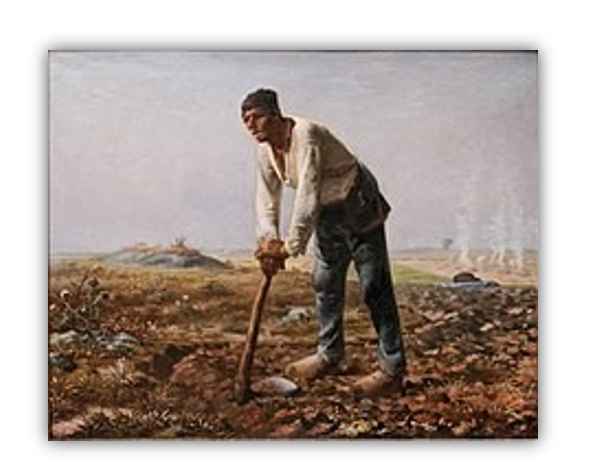After the Judgment – Image from Wikimedia
The ZEALOTS, a first century theocratic movement which believed that if an armed rebellion were incited against the Romans, a Messiah would arise and lead Israel by force back to the pure Jewish nation it once was, free from Gentile influence. The named disciples of Jesus included at least one Zealot (Simon the Zealot), very likely a second (Judas Iscariot), and possibly James and John as well; and there are those who believe that Jesus himself was secretly a Zealot at heart, infuriated with cities like Chorazin, Bethesda, and Capernaum for failing to arm themselves and support a revolution.
And the ESSENES.
The Essenes were a reclusive order who highly valued privacy – their own and the privacy of others – and who embraced strangers. They led a pious, ascetic existence, forsaking family life for the community of those who believed as they did: that Essenes alone upheld the true Abrahamic covenant with God. Residing in isolated settlements throughout Judea, and in secluded neighborhoods in its larger cities, Essenes emphasized ritual purity through daily immersion in water, scrupulous avoidance of falsehoods and pretense, forbearance from use of money, and devotion to charity and benevolence.
John, who baptized Jesus in the River Jordon, likely was an Essene; and if so, John might well have been the person who introduced Jesus to the Essene belief:
Whenever you feed the hungry,
Take in a stranger,
Clothe the poorly clothed,
Tend to one who is ill,
Be they the least of all mankind,
You have done so to God himself.
In my opinion there is no greater steppingstone to genuine altruistic character than what is found in Matthew 25:31-40.* Be that as it may, passages like Mathew 25 suggest that those of us being instructed are those who have; and those to be served are the have-nots. For how can one who is destitute feed the hungry? provide shelter for a stranger? clothe the poor? or give medical care for others who are ill?
They cannot.
I suppose that neither Jesus nor his followers ever had to worry about enough to eat, or drink, or clothes to wear. See Matthew 6:31-33. Nor did Jesus consider himself poor: “You have the poor with you always; but you do not always have me,” says Mark 14:7 and Matthew 26:11. From this it legitimately can be argued that the nature of God is to want people to have material fullness, to share their surplus with the poor, and not to dwell on it. The Haves are to provide, protect, heal, and honor; while the Have-Nots are to get on their feet. You are loved just as you are, no matter which duty is yours.
The Essenes were not thought of as being particularly wealthy people, but they had buildings set aside in their communities explicitly for the purposes of providing hospitality to strangers and healing the sick and injured.
From Dead Sea Scrolls discovered in 1947 there is an exposition of what might well have been an underlying dualistic belief among Essenes. Namely, that the actions and fate of all humans are under the control of one of two opposing forces in the world: the spirit of truth, and the spirit of injustice. How persons, wise or foolish, find their way to one of those forces depends upon their individual life experiences, their personal integrity, and the inherent strength of the goodness (or evil) residing within them. The Essenes themselves sought truth and goodness; but goodness is not a given.
The humanity of Jesus, 360° of it, emerges as a peculiar blend of the warlike Zealot nature and the peaceful wisdom of the Essenes. How we take Jesus into our own lives depends upon our individual life experiences, and upon the inherent strength of the goodness (or evil) residing within us. If there’s a term for that it might be “Nazarene.”
What “Nazarene” means today is what Jesus means to you today.
Because there is no compelling reason to believe that the word refers to an actual physical location in Galilee in the first century, since there is no convincing evidence such a place existed then, and no reference to a Nazareth whatsoever in the Old Testament. To me, a “Nazarene” might just as well refer to an Essene man of peace who nevertheless believed in the Messiah and in the apocalyptic end of the world.
There are varied worlds that exist in this universe. I am sure of that.
For example, there is yours, as there is mine.
Strength comes to those who believe in their inner strength.
And discovery comes from those who believe in discovery.
Without discovery there is next to nothingness.
And the Messiah?
Scrolls tell that:
“He will be called great and he will be called Son of God.
And they will call him Son of the Most High.
He will judge the earth in righteousness.
And every nation will bow down to him.”
A “Teacher of Righteousness” who will heal the sick.
That is what the scrolls tell us.
What good advice there is I repeat:
Always keep an open mind and spirit, and humble in your faith.
Be free to touch your feelings with your grief.
Respect the earth and its gifts to you – take only what you need from it.
Respect all life.
Be moral and just to all creatures and yourself.
Don’t steal, covet, deceive, curse, commit murder, adultery, or foolishness.
Be merciful and forgiving.
Avoid hateful thought.
Avoid the deceitfulness of material wealth.
Care for the needs of others and always be a peacemaker.
The lasting image of Jesus in the world was sculpted, not from marble, but by the hands of creative writers inspired by words and stories, and by the soles of a Church.
The likeness we leave behind, after the hands and feet of life have transformed us, is the choices we made under pressure, and what our friends, enemies, and Care-Nots have to say about us. But take heed: There are some blessings, some protection in being a stranger. Hiding as a tree in the forest.
* Sadly the last six verses of Matthew 25 (condemning less caring, or incapable, people to everlasting punishment) strikes out as one of the many places in the Bible inserted by writers editing the word for their own, ulterior motives. Other examples include:
Matthew 11:11 (Jesus proclaiming John the Baptist to be the greatest man born, and then inartfully walking it back).
Mark 16:9-20 (which most scholars agree was a later addition to Mark’s Gospel, not written by him).
John 8:1-11 (textual evidence suggests that the story of the woman caught in adultery was not in the original Gospel of John, and was even inserted at different places in John, and once even in the Gospel of Luke).
The entire chapter of John 21 (which follows John 20 like a postscript).
Luke 22:19-20 (verses consistent with 1 Corinthians 11:24-25, but inconsistent with the message elsewhere in Luke, which paints the death of Jesus as a miscarriage of justice and an occasion for repentance).
Luke 22:43-44 (Jesus sweating blood – verses not in our earliest copies of the Gospel of Luke).
1 John 5:7-8 (the first line is not present in any manuscripts produced before the 16th century – likely inserted as the one passage in the Bible to support directly the doctrine of the Trinity).
John Chapter 11 (the supposed death and resurrection in Bethany of Mary’s and Martha’s brother, Lazarus, who is never mentioned in the earlier Gospels despite the fact that Mary’s anointing Jesus is – see Mark 14:3; Matthew 26:6-13; and Luke 10:38-42 – and whose death Jesus is reported to have said was for the glorification of the Son of God, that he might raise a man from the dead).
Matthew 27:50-53 (“the graves were opened; and many bodies of the saints which slept arose, and came out of the graves after his resurrection, and went into the holy city, and appeared unto many”).

